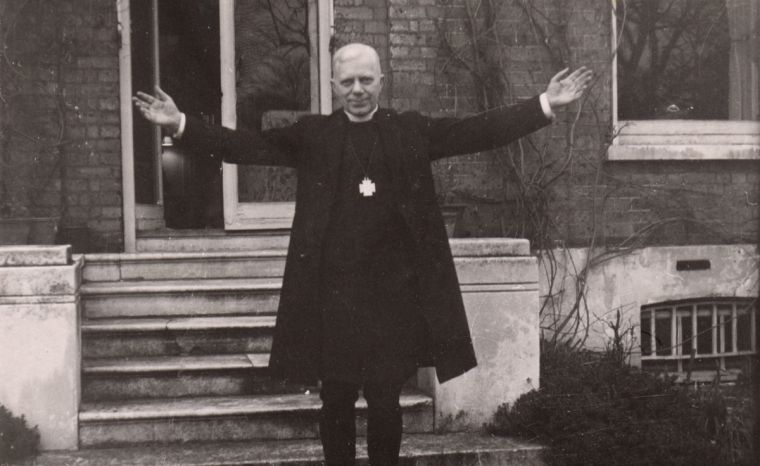Archbishop of Canterbury apologises after Bishop Bell inquiry finds latest allegations unfounded
The Archbishop of Canterbury has apologised 'unreservedly' after an inquiry into the latest allegations against Bishop George Bell found them unproven.
Bell (1883-1958), whose wartime work led to him being regarded as a hero by many Anglicans, was accused of sexually abusing a child during the 1940s when 'Carol' approached the office of Justin Welby in 2013. The Diocese of Chichester paid compensation to her and the Bishop of Chichester issued a formal apology.

However, supporters of Bell argued the evidence against him was too slender. A subsequent investigation of the Church's handling of the issue by QC Alex Carlile found it had 'rushed to judgment' and had 'failed to engage in a process which would also give proper consideration to the rights of the bishop'.
Welby rejected calls to state unequivocally that Bell was not guilty and in January last year the Church's national safeguarding team said it had passed 'fresh information' to Sussex Police regarding Bell in a move that was widely criticised.
Now, however, an investigation by ecclesiastical lawyer Timothy Briden has concluded that allegations against Bell subsequent to Carol's – which he was not asked to consider – were unfounded. Among them were that Bell abused another child, 'Alison', whose evidence was 'unverified by independent sources and her account being unreliable', and 'witness K', who said his mother had seen Bell engaging in sexual activity in his old age over a motor car. Briden described the 'hearsay' account as being 'inherently unconvincing and without corroboration'.
In a statement, Welby said: 'The Church's dilemma has been to weigh up the reputation of a highly esteemed bishop who died over 60 years ago alongside a serious allegation. We did not manage our response to the original allegation with the consistency, clarity or accountability that meets the high standards rightly demanded of us.
'I recognise the hurt that has been done as a consequence. This was especially painful for Bishop Bell's surviving relatives, colleagues and supporters, and to the vast number of people who looked up to him as a remarkable role model, not only in the Diocese of Chichester but across the United Kingdom and globally. I apologise profoundly and unconditionally for the hurt caused to these people by the failures in parts of the process and take responsibility for this failure.'
However, he said it was 'still the case that there is a woman who came forward with a serious allegation relating to an historic case of abuse and this cannot be ignored or swept under the carpet. We need to care for her and listen to her voice.'
Welby said: 'This very difficult issue therefore leaves the church with an impossible dilemma which I hope people with different perspectives on it will try to understand.'
He concluded: 'Finally, I want to make it very clear that Bishop George Bell is one of the most important figures in the history of the Church of England in the 20th century and his legacy is undoubted and must be upheld. His prophetic work for peace and his relationship with Dietrich Bonhoeffer are only two of the many ways in which his legacy is of great significance to us in the Church and we must go on learning from what he has given to us. I hope that ways will be found to underline his legacy and share the learning from his life with future generations.'
A statement from the Bishop of Chichester, Martin Warner, said the diocese apologised 'profoundly and sincerely' for its shortcomings. It said that 'we have learned that the boundaries of doubt and certainty have to be stated with great care, that the dead and those who are related to them have a right to be represented, and that there must be a balanced assessment of the extent to which it would be in the public interest to announce the details of any allegation.'
'It is now clear that if an announcement about any other person is to be made, it must not imply certainty when we cannot be certain. We have also now understood much more besides, in particular about the trust that people place in us and their legitimate expectations of us as guardians of the inheritance of faith,' the statement said.
It concluded: 'We have all been diminished by this case. The legitimate quest for certainty has been defeated by the nature of the case and the passage of time. Bishop Bell cannot be proven guilty, nor can it be safely claimed that the original complainant has been discredited. There is an uncertainty which cannot be resolved.
'We ask those who hold opposing views on this matter to recognize the strength of each other's commitment to justice and compassion. Moreover, we continue to believe that the good things that George Bell did in his life will stand the test of time. His prophetic work for peace and his relationship with Dietrich Bonhoeffer are only two of the many ways in which his legacy will go on being of great significance to us in the Church and we hope and pray we can go on learning from what he has given to us.'
The Independent Inquiry into Child Sexual Abuse (IICSA) is expected to address the Bishop Bell case as part of its report later this year.











